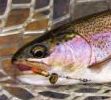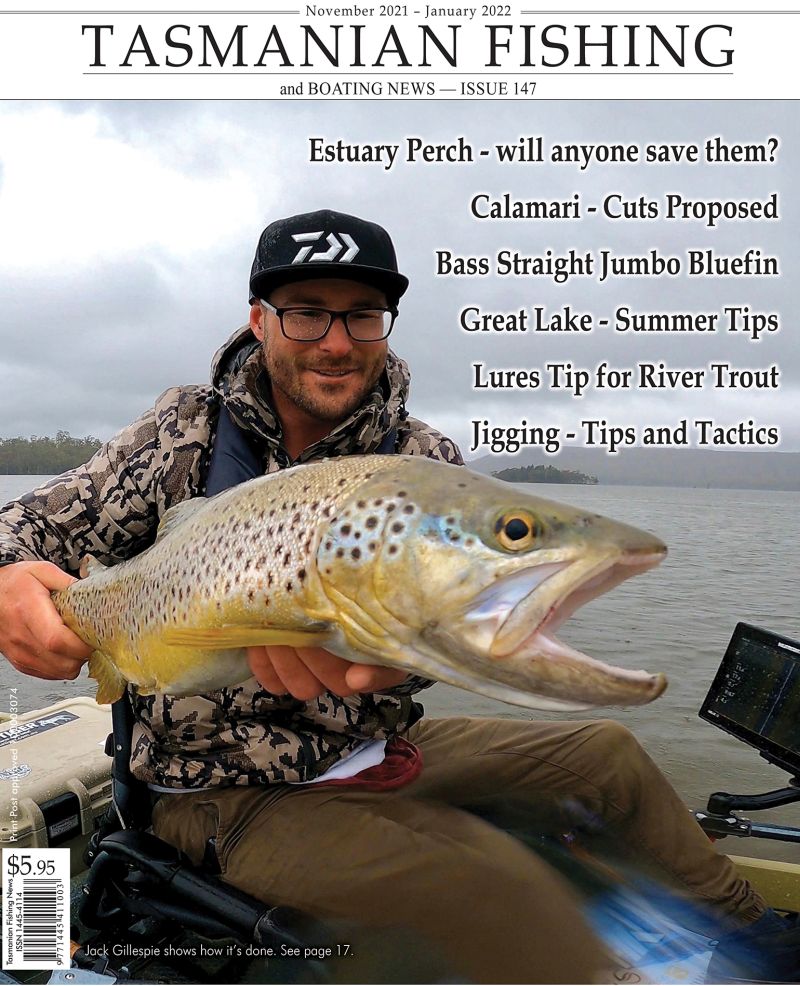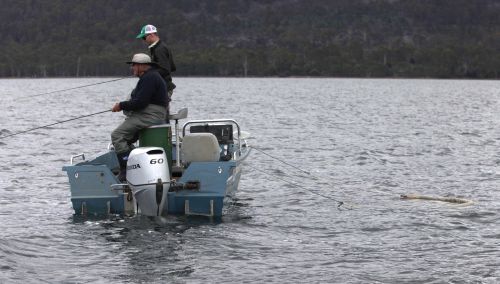From the Archives ...
Fishing on the Wild Side
Fishing on the Wild Side
Mike Fry doesn’t only live on the Wild Side of Tasmania, but also goes fishing in probably the wildest boat ever to troll for trout—certainly in Tasmania.
When your mate says ‘What are you doing tomorrow, want to come up the Gordon for the night?’ it would be pretty hard to say anything else except “you bet” and start checking out your tackle box and packing your overnight bag. But if your mate was Troy Grining and he wanted to give his new 52ft, high speed cruiser a run across Macquarie Harbour, test the new onboard dory with a chance of landing a nice Gordon River Brown you would have to feel privileged. I didn’t say anything about getting on my hands and knees and kissing his feet…just having a lend of ya’ but I did feel very appreciative.
Please check all relevant authorities before fishing - www.ifs.tas.gov.au and dpipwe.tas.gov.au . Don't forget issuu.com/stevenspublishing for years of back issues !
Fly Fish Australia Inc. is pleased to announce that it has been successful in its bid to host the World Fly Fishing Championships in 2019.
The bid voted on by the world members of FIPS Mouche in Setubal Portugal on April 15th was unanimously supported by some 30 member countries.
Tasmania will be the host state for the event which is planned for November of 2019 and to be based at the Country Club Tasmania in Launceston.
The competition which will be fished on the lakes and rivers of Tasmania will attract some 28-30 angling teams each representing their country and along with other international visitors accompanying the teams will represent a significant boost to the state’s tourism industry.
The actual competition spans 4 days and all fish will be caught and released unharmed.
- Written by Stephen Smith - Rubicon Web and Technology Training
- Category: Fishing Competitions
- Hits: 4635
ABC Article
This ABC News article describing the recent marine "heatwave" may be of interest to TasFish Readers.
- Written by Stephen Smith - Rubicon Web and Technology Training
- Category: Meteorology and Weather
- Hits: 5027
By Todd Lambert Presented from Issue 93
I have been fishing for as long as I can remember and my passion for this sport is still as strong today as it was way back then, when I was a young boy.
I grew up in the rural township of Deloraine, with the Meander River flowing through its heart. Many hours were spent along the river banks with a tin of worms and infinite patience. Sometimes I would be rewarded for it, many times I wouldn’t, and upon reflection there were far too many times when I arrived home with an empty creel and nothing to show for my efforts.
That being said, and ‘once again upon reflection’, with every trip I ventured out on, I think I learned a little more, soon my luck began to change ‘dramatically’ for the better. I had learned the “basics of fishing”.
- Written by Stephen Smith - Rubicon Web and Technology Training
- Category: Trout Fishing
- Hits: 8105
Presented from Issue 93
Thousands of Tasmanians participate in recreational line fishing each year with the majority fishing in marine waters. The most popular target species is flathead with Australian salmon also keenly sought.
Tasmania has a dedicated group of over 23,000 anglers who trout fish each year, many of whom also fish in marine waters. However, a larger proportion of recreational anglers who fish in marine waters don’t go trout fishing. If you are one of these anglers, why not give trout fishing a go this season?
- Written by Stephen Smith - Rubicon Web and Technology Training
- Category: Saltwater and Estuary Fishing
- Hits: 4399
Presented for Issue 93
Once regarded as a trophy fishery, the status of Lake Crescent slowly declined after the discovery of carp (Cyprinus carpio) in 1995, and repeated extreme drought and low water levels caused a significant decline in trout populations. The establishment of carp in Lake Crescent not only posed a risk to the trout through the destruction of suitable habitat and decreased water quality, but also had the potential to outcompete the threatened Golden galaxias (Galaxias auratus).
- Written by Stephen Smith - Rubicon Web and Technology Training
- Category: Lake Crescent
- Hits: 6373
Presented from Issue 93
Once a prime trophy water, Lake Dulverton has suffered significantly from periods of drought since the 1980’s and has dried up on several occasions since then. Most recently, only the small ‘coffer dam’ – the small section at the base of the main lake – remained as an aquatic refuge.
- Written by Stephen Smith - Rubicon Web and Technology Training
- Category: Lake Dulverton
- Hits: 6497
 Trout number 700 for the 2015/16 season caught today. 7/4/2016
Trout number 700 for the 2015/16 season caught today. 7/4/2016
Only needing two more trout to reach my target of 700 before the end of the 2015/16 season I headed off to the Mersey River at 4.00pm to see if I could pick up the two required fish. I had three sections of river already picked out that I thought would give up the fish that I needed. I was certain that if one section didn't then one or both of the others would. There was a strong gusty Westerly wind blowing with plenty of cloud about as well. I started off with the black fury (black blade) as I wanted to reach the 700 on the Mepps black fury seeing as these spinners have caught around 95% of my catch this season. They've also done this over the past 50 plus years of my trout fishing as well.
- Written by Stephen Smith - Rubicon Web and Technology Training
- Category: Mersey River
- Hits: 3840
Read more: Trout number 700 for the 2015/16 season caught today. 2016-04-07
by Craig Vertigan - Presented from Issue 91
It’s easy to forget what a great sports fishery we have on our doorsteps living here in Hobart. When I have a full day or a weekend to spare for a fishing trip nine times out of ten it will be somewhere other than my local system. This leaves me doing shorter trips from an hour to a half day on the Derwent. Some of those trips can be just awesome and it leaves me wondering how good it could get if I concentrated my efforts for a whole day or two.
- Written by Stephen Smith - Rubicon Web and Technology Training
- Category: Derwent River
- Hits: 22181
Daniel Paull - Presented from Issue 91
As everyone is aware, with the current fuel prices and particular pelagic species becoming harder to find each year, we must become smarter in the way we approach our game fishing. St. Helens has been the game fishing capital for many years, but this has changed. Most people will agree that Eagle Hawk Neck is now the most popular fishing destination for large pelagic species such as the Thunnus maccoyii or southern bluefin tuna. St. Helens can still be a productive fishery if people start to use different techniques and tactics. I fish game fishing tournaments with a team of four keen anglers, and I having been doing so since I began attending the events. We have become very effective in the way we go about targeting specific species, including that of the albacore and southern bluefin tuna. Over the years, we have employed various techniques into our game fishing, live baiting and cubing have been our most successful methods.
- Written by Stephen Smith - Rubicon Web and Technology Training
- Category: Tuna Fishing and other Game Fishing
- Hits: 5094
Presented from Issue 91
Autumn is such a wonderful time of the year. Cool nights, mostly sunny days and light winds. As I write this I am looking out over Great Lake – there is a slight ripple and some superb slicks gliding about here and there. I will go and look more closely at them after lunch. Hatches of jassids and ants are on the trout’s menu and both of these small insects end up in the slicks that form with the morning breeze.
The trout often go crazy on them.
- Written by Stephen Smith - Rubicon Web and Technology Training
- Category: Jan’s Flies
- Hits: 3961
Subcategories
Current TFBN
Click above for current issue content. The current issue of TFBN is extensive and topical. In Tackle Stores, Newsagents and by subscription.
Delivered to your door for $48 for 2 years (8 issues). To subscribe, send Mike $48 via www.paypal.com.au . (Basic instructions are here) The email is at Contact Us. Your address will be included from PayPal.
Or phone Mike with your c/c handy on 0418129949
Please ensure your details are correct, for Mike to organise delivery.
TFBN Newsletter Sign up Form
Why not submit an article ?
When you have finished for the day, why not have a brag about the ones that didn't get away! Send Mike an article on your fishing (Click here for contact details), and we'll get it published here. Have fun fishing - tasfish.com
Category Descriptions
Here is a list of all of the Article Categories. The number in Brackets, eg (13) is the number of articles. Click on Derwent River and all articles relating to the Derwent will be displayed in the central area.
Articles by Category
-
Rivers (3)
-
Saltwater and Estuary Fishing (149)
-
Kayak Fishing (34)
-
Lakes (1)
-
Great Lake (62)
-
Lake Leake (52)
-
Woods Lake (16)
-
Lake Augusta (11)
-
Huntsman Lake (13)
-
Lake Pedder and Gordon (10)
-
Lake Dulverton (5)
-
Lake Crescent (6)
-
Tooms Lake (10)
-
Lake Mackintosh (2)
-
Lake Barrington (5)
-
Little Lake (8)
-
Meadowbank Lake (5)
-
Lake King William (7)
-
Lake St Clair (2)
-
Western Lakes (12)
-
Arthurs Lake (35)
-
Lake Echo (7)
-
Four Springs (54)
-
Lake Sorell (7)
-
Lake Burbury (6)
-
Other Lakes (57)
-
Brushy Lagoon (18)
-
Little Pine Lagoon (5)
-
Penstock Lagoon (16)
-
Brumbys Creek (7)
-
-
Events (48)
-
Estuary Fishing (0)
-
Coastal Catches (46)
-
Super Trawler (46)
-
IFS, DPIPWE, MAST and Peak Bodies (435)
-
Commercial Interests (98)
-
Other (24)
-
TFBN Back Issues (8)
-
Fly Fishing (67)
-
Trout Fishing (250)
-
Meteorology and Weather (8)
-
Jan’s Flies (50)
-
Tuna Fishing and other Game Fishing (86)
-
Cooking Fish (19)
-
Fishing Information (1)
-
Fishing Books (8)
-
Videos (5)
-
Tackle, Boats and other Equipment (146)
-
World Fly Fishing Championship 2019 (2)
Popular Tags
windyty.com
Visit https://www.windyty.com/
Rubicon Web and Technology Training
Hello everyone, I thought it would be a good time to introduce myself.
My name is Stephen Smith and I have been managing the website tasfish.com since May 2009.
It has been an epic journey of learning and discovery and I am indebted to Mike Stevens for his help, support and patience.
I am developing a new venture Rubicon Web and Technology Training ( www.rwtt.com.au ). The focus is two part, to develop websites for individuals and small business and to train people to effectively use technology in their everyday lives.
Please contact me via www.rwtt.com.au/contact-me/ for further information - Stephen Smith.
From the Archives ... (last chance)
Sea Run Trout
Mid Sea-Run Season Report
Sea-run trout fishing this year got off to a cracking start in most areas, with the majority of anglers employing nearly every trout fishing technique to secure fish in local estuaries statewide.
Even those anglers fishing the "off-season" lower down in our estuaries for sea-trout commented on the number of fish moving in early August.




